I once took a job at a company with a lot of great people and customers, but from the start, something wasn’t right. Looking back on it, it was obvious that there was a cultural alignment issue. At the time though, what I could see was a lot of baffling behavior on the part of others, and I experienced a lot of confusion on the part of others about my behavior.
I would work hard on something and actually do a good job, but my effort would not be valued. I would be asked to work on things that simply made no sense to me. And no matter how much talking we did, it seemed like we were never on the same page when it got time to deliver.
After trying to make it work for 2 years, I finally admitted to myself that it was a bad fit and decided to move on. And, don’t get me wrong. It was a hard decision, I did not enjoy the journey, and I had a hard time not just blaming the other party/parties, but the rational part of me knew then–and knows now–that the issue was not that either party was bad or at fault per se. It was a bad cultural fit.
Unfortunately, I worked with people there that experienced the same thing and took it harder. For the sake of privacy, I won’t get into details except to say that I’m about as low anxiety of a person as you can get. On the Big 5 personality trait of Neuroticism, I’m 14th percentile, and I’m 1st percentile in Withdrawal, so I typically experience little anticipatory anxiety and rarely have a long lasting negative emotional state. It wasn’t like that for others though unfortunately.
The Impact of Stress
Think of a seesaw. When one side is down, your stress level is low, and your non-stress level is high. I’m calling it non-stress here because there are a lot of things that are the opposite of stress.
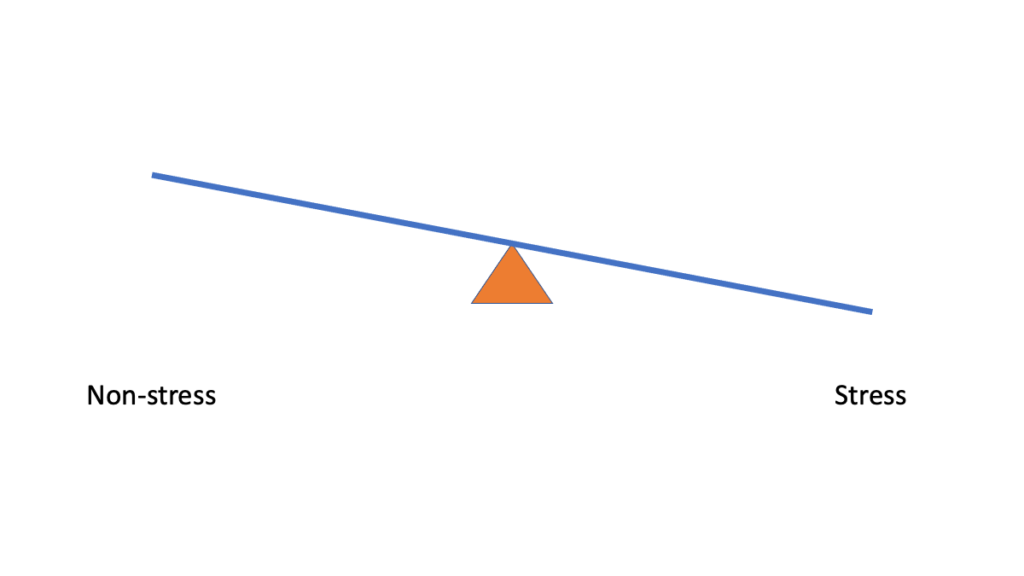
For all people, even people like me, there are times of stress. Like happiness, sadness, etc, stress comes and goes. It’s like weather. The personality traits I mentioned above are more like climate. Despite the fact that my climate might have a naturally low balance of stress response, storms do blow through.
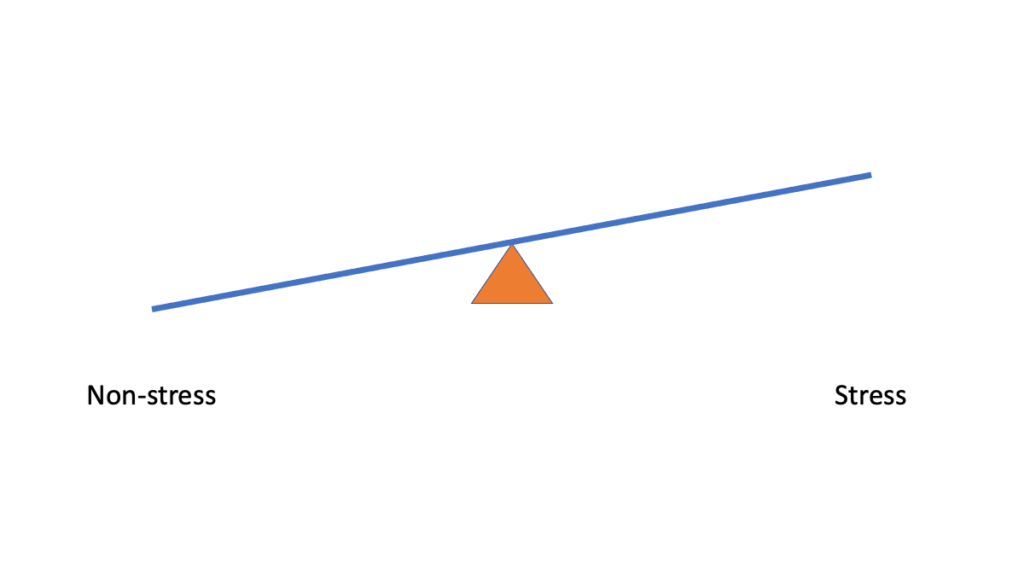
When you get into a stressful situation, many things occur. Your body shuts down nearly everything that you do not need to survive right now, so for example, your kidneys stop processing fluid, and your body actually begins breaking down your immune mechanisms. Who needs an immune response that might keep you from getting a cold when you might not live beyond today?
In ideal circumstances, you get into a stressful situation, you deal with it, and it passes after a reasonable amount of time. Some people hold onto their stress response longer than others, but in the ideal circumstances, this is periodic, and they are able to move on.
Highly stressful situations though create stronger stress responses though, and therefore, the swings between non-stress and stress are larger.
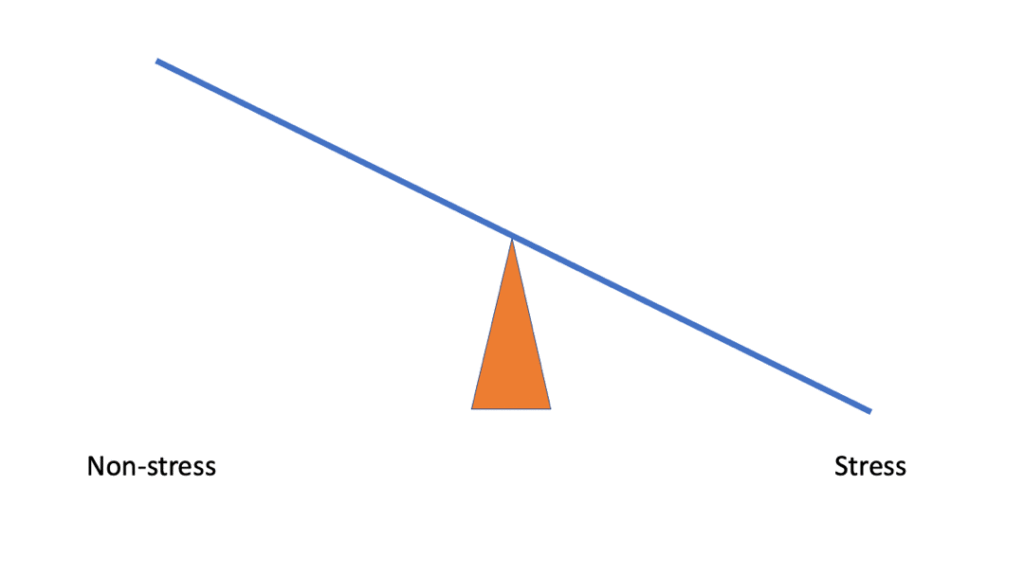
The more often you swing between stress and non-stress, the more wear and tear it puts on your body to adjust. In our visual, it’s a fulcrum. In your body, it’s all of the mechanisms that flood hormones into your blood to stop or restart activity, turn on or off organs, and so on. The more this happens, the more difficult it becomes to switch, and you find yourself simply staying in stress for longer, taking longer to come down when something has stressed you out. It’s like your climate-level balance of stress has gone up.
When you get into stress response, your body shuts down what it does not immediately need and even goes so far as to break down your immune response mechanisms. Imagine a baby on the end of a very high seesaw with mom underneath doing everything she can to protect that baby if it falls off, but not really being able to do anything because she’s too far away. Nonetheless, her attention is still 100% focused on something she cannot do anything about.
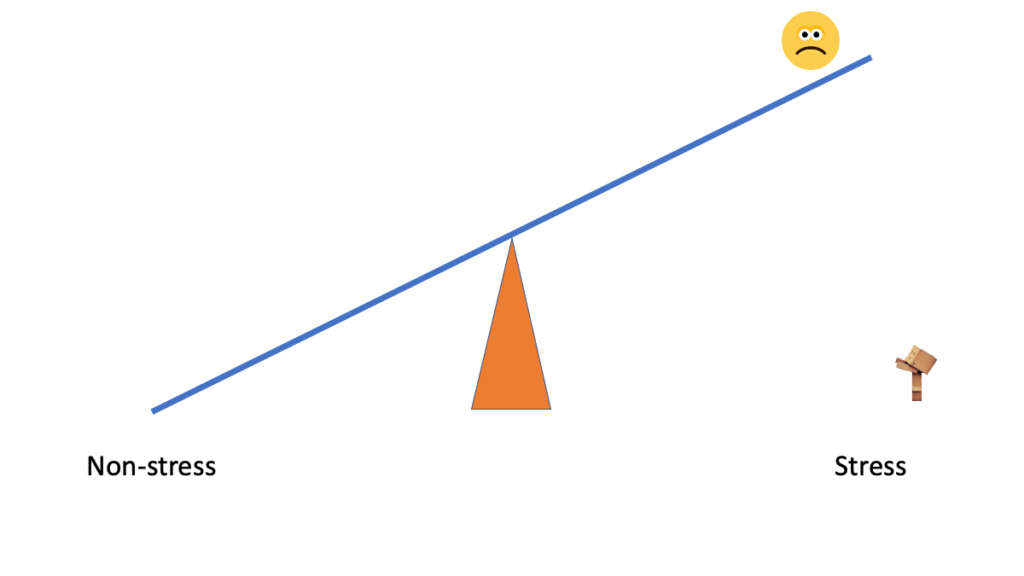
When you have frequent stressful situations though and that fulcrum begins to wear out, so that you find yourself staying in stress for longer (with a higher climate balance of stress as I’ve put it), your body does not just recruit mom to watch the baby. Your body recruits everybody in the neighborhood.
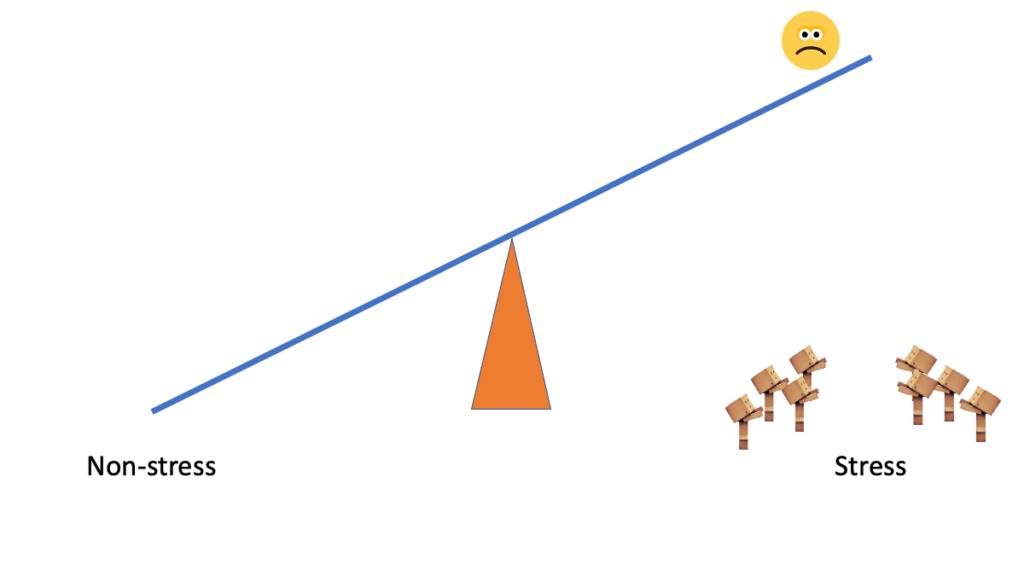
Now, everyone that should be doing a job, earning some money, participating in the neighborhood watch, mowing their lawns, and more are instead doing anything they can to get you out of danger instead of doing their jobs.
This is one way that stress contributes to illness. Your body is so focused on dealing with the stress, and its ability to do so has gotten so worn down by repeated bouts of stress that it’s less and less effective despite throwing more and more at it. And while your body is focused on fighting the stress, viruses are getting through the cracks, plaques are building up in your arteries, and more.
Company Cultures and Stress
When you work in a situation like I was in, you will experience stress more often. You will be working hard, in that non-stress position, turn something in, get a reaction you were not expecting, and go into stress response. The more often you are misaligned, the more often this is going to happen. Hopefully, you get along with your coworkers, but more than likely, the misalignment also contributes to there being THEM and YOU, so not only might you be having work problems, you’re also alone.
And, as studies have shown, lonely and isolated people also have lower immune response.
If you read my post about levels of culture, you will see that this is all the more likely to happen when you take a job in a new/different kind of culture, but you believe you’re aligned on values. You will think that–based on X value–you will know what to expect, but due to underlying basic assumptions that no one talks about and few people (certainly not you due to you being new) understand explicitly, you will run into situations in which it appears that your colleagues are not acting in alignment with the values.
This creates that stress response. To you, the values say A + B = C. You experienced A + B = D. And now, you’ve run into a challenge.
The more that you deal with this, the harder it will become to deal with the stress, and the more likely it is that you get to a point where these occurrences contribute to a lower overall level of both health and satisfaction. And, all because you took a job where you are misaligned with the company.

Company Culture, Stress, and Leadership
Ask any leader and they will say that they want a strong culture, everyone aligned around values, etc. Look at how most of them act though. Many people have said some version of:
Don’t pay attention to what people say. Pay attention to what they do. Behavior never lies.
Even if leaders say they want a strong culture, alignment, and more:
- It’s hard to do and rarely something that pays the bills today.
- They might have no idea or true intention to actually work on it.
Even if only for financial reasons though, it is in leadership’s best interests to ensure organizational culture is strong. The last time I saw these numbers, the cost of healthcare added $1,500 to the price of every car sold in the United States. That means, if you buy a Honda Civic or Toyota Corolla, you’re paying around 10% just for the healthcare expenses of the employees that worked on the car. As a consumer, I certainly would like to pay a bit less for products if I could, and healthcare expenses are a major contributor to prices.
In the United States, these are currently the top 4 chronic healthcare conditions:
- Heart disease.
- Cancer.
- Diabetes.
- Stroke.
All of those have proven ties to stress.
With the cost of healthcare being a major expense for employers and sickness being a major reason that someone might either not come to work or not be able to do their job well, it is in employers’ best interests to improve their employees’ health as much as possible. And, stress is a major contributor to health that leadership can have influence on through things like ensuring that you hire people aligned with–and cultivate people aligned around–your culture.
To not do so risks significant pain for the individual employee and lower overall success for the organization…although you might not realize why if you don’t bother to focus on these things.


